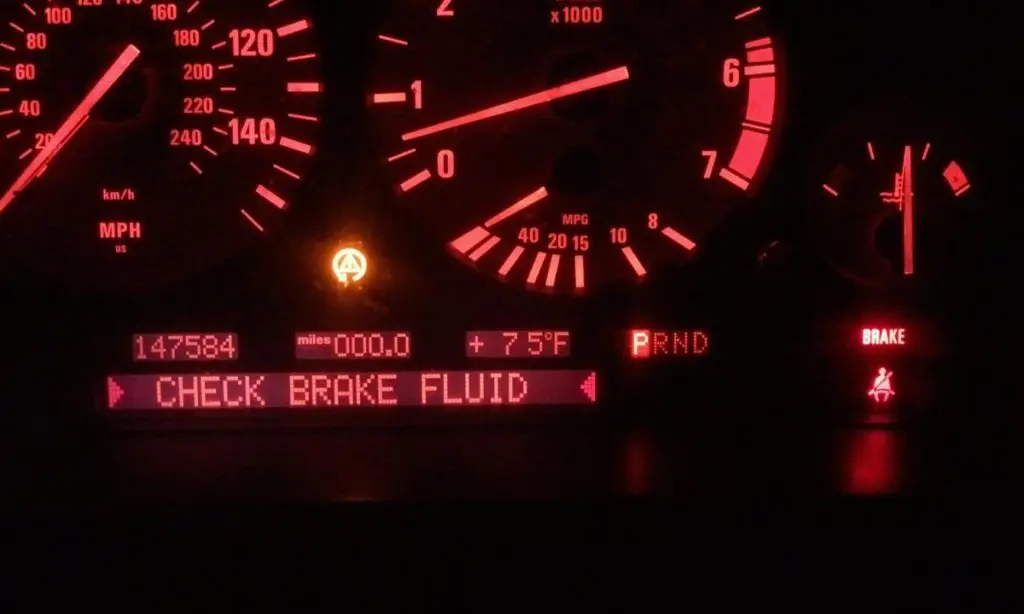You might have seen in the movies that something happens to the car, and all of a sudden the brakes aren’t working. Well, this mostly happens due to the leaking of the brake fluid. In fact, the most overlooked of all the fluids in your car is the brake fluid.
No matter if your car has hydraulic brakes or the traditional ones, the absence of the brake oil or low brake fluid will result in the inefficiency of your braking components. Especially hydraulic braking systems since they need braking fluid to increase the pressure for stopping the car.
As the brake pressure builds up, the braking fluid is supplied to the pads that help the rotors to come to halt, stopping the car. For building up the necessary pressure that the braking systems need, the vehicle must have enough braking fluid to help assist the components.
Your vehicle’s braking system will be ineffective if the fluid is absent or has leaked from the car. This will not result in building the pressure needed to stop the car.
Causes & Signs of Low Brake Fluid
Your vehicle may signal low brake fluid when the fluid is low. The brakes will not work and the low brake fluid light will come on. Here are some reasons behind it:
Leakage
One of the main reasons for low brake fluid is that there can be a leak in the system. No matter where the leak has occurred, in the master cylinder, brake lines, hoses, or calipers, the leak can disrupt the entire braking system. What happens if the brake fluid is low? Your brakes will not be able to build up the pressure due to lesser brake oil.
The leaks can occur due to the constant wearing of the components. It can also occur from any tears that may have caused while hitting something during driving. You can identify the leak in the brake fluid by spotting a residue under your parked car. In addition, you can also identify this by locating and checking the brake fluid reservoir under the hood.
Worn Out Brake Pads
Another reason why your low brake fluid light may come on is due to the worn-out brake pads. Since these pads will only work if they are receiving adequate fluid, their wearing may cause issues.
The fluid has to travel farther to the auto brake pads, away from the main housing. This makes the caliper piston force the fluid for reaching the pads. The fluid depletes over time, causing low pressure to build up and in end indicating a low brake fluid light.
Damaged Brake Line
A damaged brake line can also be a reason for low brake fluid. This happens when the components that are made from steel tend to wear out with time. Rust and wearing can damage the brake line, causing a leak in the flow. This results in low brake fluid reaching the pads, hence indicated by the light.
Signs When You Need To Change Or Flush Your Brake Fluid
If you’re experiencing a change in your vehicle braking, then it means that either there’s a leak or the fluid has completely leaked out. That is why it is essential to administer the situation and inspect whether the fluid is leaking out or not. However, it is recommended that you take your vehicle to the automotive shop right away to avoid any uncongenial circumstance.
Here are some symptoms when you’ll be needing to inspect, change, or flush your brake fluid:
Warning Light
The foremost sign is your brake fluid warning light. When this comes on, you can be sure that there’s a problem with your braking fluid. It’s pretty rare that the sensors of the car become faulty and report false issues of your car.
However, most of the time, they are correct, and you should pay heed to what they signal. The light comes on when the brake fluid gets low. Since it’s completely sealed, a decrease in the level can only be caused due to a leak, which is why you need to get it checked immediately.
Dirty Fluid
Another reason why you should get your brake fluid changed is that it can get dirty. The fluid will become black or brown with particles and debris. This makes it inefficient for the braking system and hence you should get it changed.
Mushy Brake Pedal
If you feel spongy while braking, then it means there’s an issue with your braking system. This happens when moisture builds up in your braking system. This moisture then boils up with the heat, heating the overall system, and causing hard to brake. The steam due to the boiling causes an increase in the brake lines, which cannot be compressed. It stops the fluid from reaching the pads, hindering the braking.
Brake Replacement
If you get your braking system opened, there’s a possibility of contamination. By having your old brakes flushed out, you should ensure their high workability.
While doing the above remedies, make sure to refer to an automotive technician that is an expert and works professionally, handling braking system and braking fluid issues. Safe driving!
While this might not be necessary getting your brakes replaced will allow them to function properly instead of getting them repaired. There are times when repairing doesn’t provide the accuracy and efficiency needed by your car. Therefore, it’s important that you take your car to a professional mechanic and get it checked so that your vehicle’s brakes can be replaced. However, ensure that they are completely worn out. In case they aren’t then it’s possible they need cleaning or there is another issue with your vehicle. Ask the professional brake repairs to make a complete assessment of the brake system to implement the right solution.


A mushy pedal is something that I really appreciate you talking about in this article. Reading this made me think about the current situation of my car and how the brakes feel a lot safer than they should be. I’ll go and ask an auto repair service to help me with this as soon as possible so we don’t come up with any problems on the road soon.